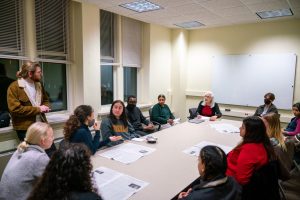Nautical Poetry Tells Tale of Hurricane Sandy
April 1, 2016
Chair of the Creative Writing Program Kazim Ali began a poetry reading by Margaret Ross and Robin Beth Schaer on March 10 by asking those in attendance if they recognized the metrical pattern of the radiator’s rhythmic banging — a trochaic beat. This was a fitting observation, as both Ross and Schaer’s work draws on the rhythm of their experiences.
Shane McCrae, assistant professor of Creative Writing, giddily introduced Margaret Ross. McCrae confessed that when he met Ross at a workshop with Jorie Graham at Harvard University, he experienced the kind of jealousy a poet feels when they meet a 19-year-old who’s better than they were at the same age. McCrae lauded Ross as a genius, insisting that hers was the poetry of the future — unsurprising for those who’d received an email from McCrae a week earlier, titled “Genius is Coming,” in which the poet referred to Ross as the Sex Pistols before they became the Sex Pistols.
Staring straight ahead under the harsh white stage lights, Ross recited her poems from memory. Her performance was bone chilling, bordering on creepy, cold yet exhilarating. Ross’s facial expressions showed her consideration for each word; her affectation was very much a part of her recitation.
Ross’s work rewards repeated engagement. On first read, its density may cause one to gloss over moments of beauty, like in “A Timeshare”: “Yes though / if there’s such a thing as time at all I never saw it / move and if that’s so then what am I / So afraid of?” Although she may seem unfamiliar with the constructs of Earth, many of Ross’s poems are precise, fairly literal observations of the world through her eyes. For example, in “The Line,” she describes the play of light and shadow at dawn: “…Dawn / cuts out the trunk and drains its shadow.” Ross’s style is clear and severe. From the rich sensory details she provides, it’s clear that she is consistently observing the world around her with great detail. Her eye is a laser; even shifting shadows don’t escape its purview.
The delivery of Ross’s poems did not match how they looked on the page. While her lines cut a harsher look on the paper, Ross followed the rhythm of the syntax, stringing her words together delicately.
Ross explained that she’s a slow writer. The subjects she writes about tend to marinate in her head for a long time before she puts them down on the page. The world she weaves in her poems, which may be quite ordinary to her, remains a wonder for those who listen.
Ali introduced Robin Schaer by reading from Cesare Cassarino’s theory book Modernity at Sea: Melville, Marx, Conrad in Crisis, from which he drew the conceptual framework of the “ship as society,” a hermetic space that serves as a microcosm for society at large. Ali explained that like Herman Melville, Schaer is not so much concerned with the epic or narrative as she is with the quotidian moments that make up our lives. Ali finished his introduction by pointing out that although the visiting poet’s surname could be taken to mean either “lioness” or “poetry,” in Farsi, he felt a more accurate title for Schaer would be “Lioness of Poetry.”
Schaer’s performance was a smooth, lyrical story of exploration and its perils. Take “Middle Flight”: “In Brazil, a priest / hitched himself to a thousand balloons / and was gone. He must have whispered céu / as he climbed aloft (only in English are heaven / and sky different words).” Schaer’s use of language — deceptively simple and accessible — allows for the emergence of deeply engaging and complex narratives.
History also informs Schaer’s pieces. In “Natural History,” written for the poet’s son, she writes, “There are seven white rhinos when you are born / A year later, six. I try to tally the animals vanished in my lifetime / and lose count.”
Schaer is interested in exploring destruction not for the sake of spectacle, but in order to better understand and learn how to survive disaster. Schaer herself is no stranger to environmental crisis. The poet was working as a deckhand aboard The Bounty, a 180 foot, fully-rigged ship, when it was lost at sea during Hurricane Sandy in 2012. The captain and a fellow crewmember went down with the ship. Much of her acclaimed book, Shipbreaking, draws on this experience. For instance, her use of ‘we’ exclusively refers to the ship’s crew. She writes, “She was safer at sea / we were not safer at sea … we were alive / we drowned … we were never found.”
During the brief question and answer session, Schaer explained that when constructing her poems, the constraints of a metrical pattern offer a helpful framework because she only needs to focus on filling in the spaces. After writing her lines in meter, she breaks up the metrical pattern as she sees fit. The final result is a poem that flows from line to line, the ghost of meter ever-present in her work.

























